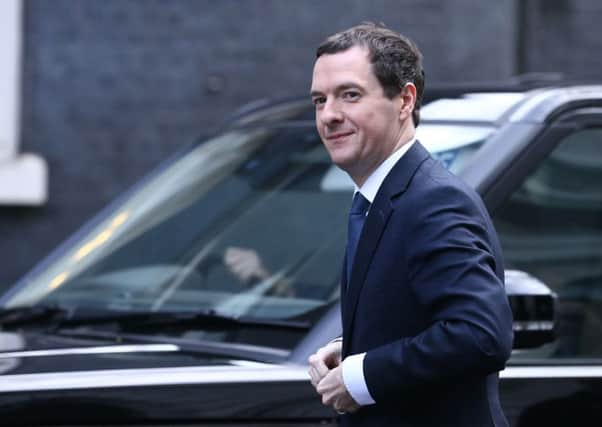Tom Peterkin: Osborne emerged as a key player in fiscal deal


According to their version of events, it was Osborne’s intervention towards the end of what had been tortuous negotiations which eased the deadlock.
Before the Chancellor entered the fray, Scottish Government negotiators had claimed to be puzzled by the intransigence of the UK government. Close observers of the talks, viewing them from the SNP perspective, claim the time-honoured, choreographed customs of such discussions were not being observed by the Treasury in the early stages.
Advertisement
Hide AdAdvertisement
Hide AdThe give-and-take normally associated with political negotiations were absent as the UK government refused to budge on its position when it came to calculating how much of its block grant Scotland would lose as a result of gaining more power over taxation.
The sticking point was the Scottish Government’s claim that the method of calculation favoured by the Treasury would leave Scotland billions of pounds worse off – breaching the “no detriment” principle of the Smith Commission.
As political anoraks know, the Scottish Government was demanding a block grant calculated by a per capita indexation formula that would make allowances for Scotland suffering a reduced tax-take as a result of population growth here falling behind the rest of the UK.
With the Treasury stubbornly sticking to its model, a theory began doing the rounds in SNP quarters: that Westminster’s traditional hostility to the financial package that sees Scotland receive more cash per head as a result of the Barnett Formula was driving the UK government side. There was a suspicion that the talks were being seen as an opportunity to come up with a method of funding the devolved nations that was more acceptable to a Treasury anxious to keep a tight rein on the purse strings.
There was also the SNP suggestion that this notion of “sorting out” Barnett might be encouraged by an ambitious, front-bencher anxious to make a name for himself during the talks. Step forward Chief Secretary to the Treasury Greg Hands, who started as lead negotiator.
But as Osborne became more hands-on, the UK government came up with a funding model of mind-boggling algebraic complexity, which was not per capita indexation but ultimately delivered the cash demanded by the Scottish Government.
It was a classic fudge. For the UK government it had the virtue of not being the Scottish Government’s favoured model. For the Scottish Government it delivered the cash that allowed Nicola Sturgeon to claim victory.
Another key concession made by Osborne was that negotiators dropped a proposal to default to the Treasury’s original model if agreement cannot be found when the arrangements are reviewed in five years’ time. Rather, whatever method is adopted after 2021 has to be acceptable to both governments.
Advertisement
Hide AdAdvertisement
Hide AdThe tactician in Osborne took the pragmatic view that securing the deal took priority over financial wrangling. Viewing the big picture, the Chancellor believes this is the way to move the debate on from wrangling over more powers to actually using them. In turn, the SNP has decided to accept the powers in the knowledge that the constitutional fight can always be resurrected in five years’ time.